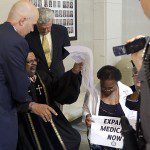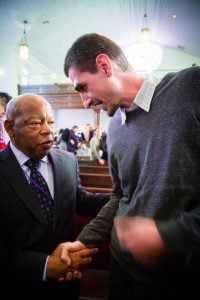As we continue to celebrate the Common Prayer Movement that’s connecting people of faith and action around the world, I want to answer a few of the frequently asked questions we’ve been hearing. If you missed it, we’ve had some great Q&A’s on common prayer with Steve Harper and Phyllis Tickle. The good news is this: the prayer renewal that’s at the heart of The Everyday Awakening is bigger than Common Prayer. It’s bigger than “new monasticism.” While these things are part of what the Spirit seems to be stirring, it seems that many, many different movements are being united by prayer that is both ancient and contemporary, time-tested and ever new.
With the release of Common Prayer’s Pocket Edition this month, we had a chance to answer some of the FAQ’s that we’ve heard consistently over the past year. We’ve included them in this easy-to-carry version so that it can serve not only as an on the road guide to prayer, but also as a sort of tract for the movement. Here’s a little excerpt. Would love to hear what questions you have (or hear).
- Doesn’t God want to hear the prayers of our heart? Why should I learn and say prayers written by other people?
Yes, Scripture says that the Holy Spirit empowers people who find new life in Christ to cry, ‘Abba.’ This is intimate language, the sort of language kids use for their parents. God isn’t just willing to hear us. When we cry out in the Spirit, God hears the voice of the One who said, “I and the Father am one.”And yet, as intimate and personal as this communication is, it is never private. To be ‘in Christ’ is to be part of a body that has prayed across centuries and is now praying around the world. To pray in the Spirit is to join the eternal song of all the saints who sing around the throne of God. Because, over time, some of those prayers and songs have been written down, we do well to hide them in our hearts and make them our own.
- Why do I need set prayers for different times of the day? Can’t I just pray the prayers I need when I need them?
‘Fixed hour prayer,’ the tradition of praying the hours—or saying particular prayers at specific times of day—is a practice those goes all the way back to ancient Judaism. Early Christianity picked this up because the church knew that it was called to live as a contrast society in the world. A regular rhythm of rooting ourselves in God’s realm and God’s time is a constant reminder that we are in the world, but not of it. Fixed hour prayer regular interrupts our schedules to remind us that the world has been interrupted by the kingdom of God… and we are called to be holy interruptions where we are.
- I’ve heard of The Book of Common Prayer. Why a new Common Prayer? What’s the point of a new prayer book? How is this one different?
If you are familiar with the Church of England’s Book of Common Prayer (BCP), you’ll recognize much of the language and rhythms of this prayer book. The BCP is the most beautiful and enduring prayer book in the English language, and we borrowed from it extensively. But we didn’t feel too bad when we realized how much the BCP had borrowed from the Benedictine manuals of prayer that preceded it. Common prayer is a long tradition, and each new resource can only build on those that have come before it.











